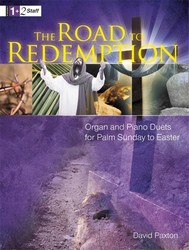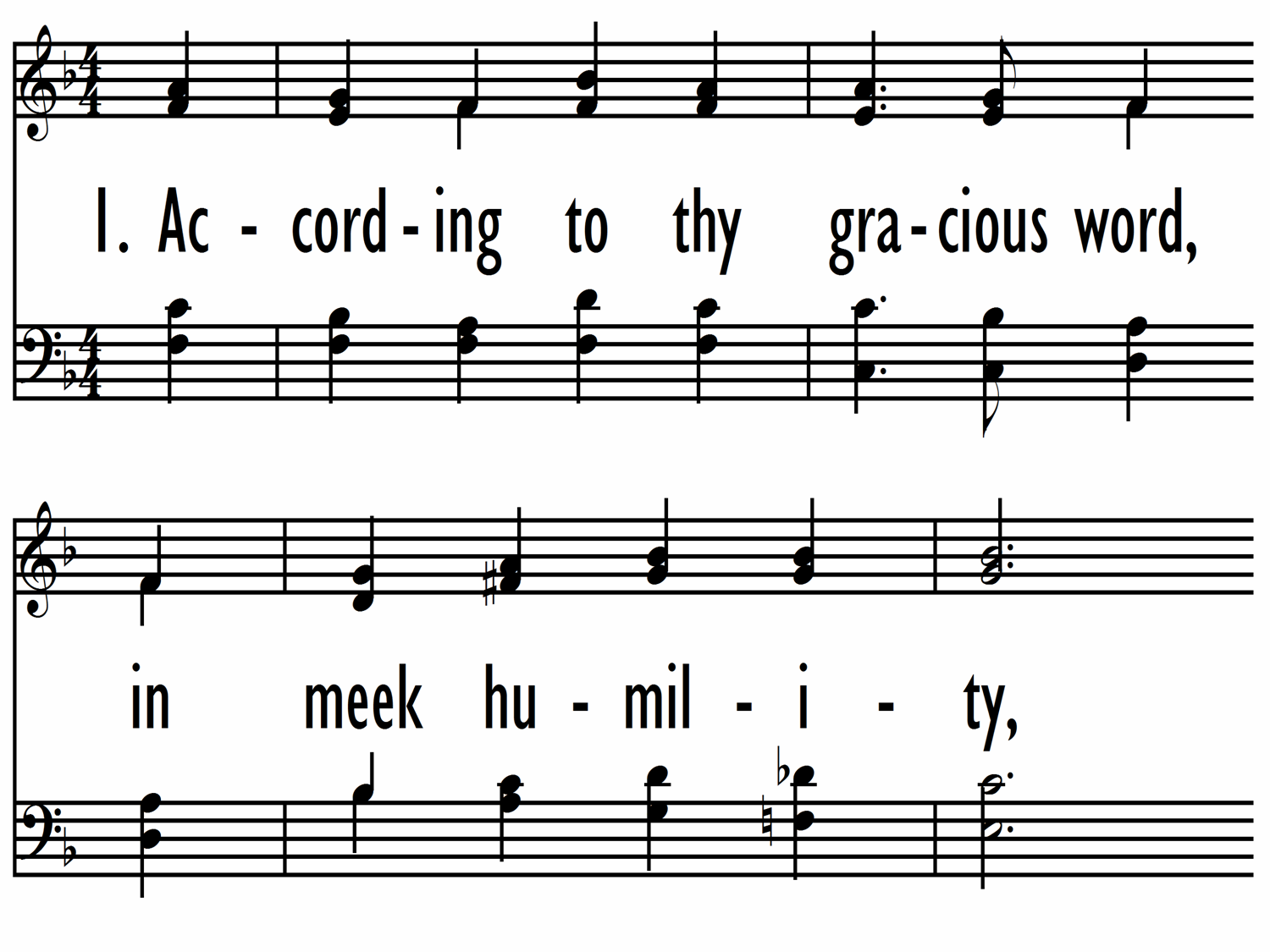- |
User Links
According to Thy Gracious Word

According to Thy gracious word
Author: James Montgomery (1825)Communion Songs
Published in 574 hymnals
Printable scores: PDF, MusicXMLPlayable presentation: Lyrics only, lyrics + musicAudio files: MIDI, Recording
Representative Text
1 According to Thy gracious word,
in meek humility,
this will I do, my dying Lord:
I will remember Thee.
2 Thy body, broken for my sake,
my bread from heaven shall be;
Thy testamental cup I take,
and thus remember Thee.
3 When to the cross I turn mine eyes
and rest on Calvary,
O Lamb of God, my sacrifice,
I must remember Thee.
4 Remember Thee and all Thy pains
and all Thy love to me;
yea, while a breath, a pulse remains,
will I remember Thee.
5 And when these failing lips grow dumb
and mind and mem'ry flee,
when Thou shalt in Thy kingdom come,
Jesus, remember me!
Source: Our Great Redeemer's Praise #238
Author: James Montgomery
 James Montgomery (b. Irvine, Ayrshire, Scotland, 1771; d. Sheffield, Yorkshire, England, 1854), the son of Moravian parents who died on a West Indies mission field while he was in boarding school, Montgomery inherited a strong religious bent, a passion for missions, and an independent mind. He was editor of the Sheffield Iris (1796-1827), a newspaper that sometimes espoused radical causes. Montgomery was imprisoned briefly when he printed a song that celebrated the fall of the Bastille and again when he described a riot in Sheffield that reflected unfavorably on a military commander. He also protested against slavery, the lot of boy chimney sweeps, and lotteries. Associated with Christians of various persuasions, Montgomery supported missio… Go to person page >
James Montgomery (b. Irvine, Ayrshire, Scotland, 1771; d. Sheffield, Yorkshire, England, 1854), the son of Moravian parents who died on a West Indies mission field while he was in boarding school, Montgomery inherited a strong religious bent, a passion for missions, and an independent mind. He was editor of the Sheffield Iris (1796-1827), a newspaper that sometimes espoused radical causes. Montgomery was imprisoned briefly when he printed a song that celebrated the fall of the Bastille and again when he described a riot in Sheffield that reflected unfavorably on a military commander. He also protested against slavery, the lot of boy chimney sweeps, and lotteries. Associated with Christians of various persuasions, Montgomery supported missio… Go to person page >Text Information
Related Texts
| First Line: | According to Thy gracious word |
| Title: | According to Thy Gracious Word |
| Original Language: | English |
| Author: | James Montgomery (1825) |
| Meter: | 8.6.8.6 |
| Language: | English |
| Notes: | Spanish translation: See "Según tu dicho al expirar" by Juan Bautista Cabrera Ivars; Swahili translation: See "Kama ulivyoagiza" |
| Copyright: | Public Domain |
| Liturgical Use: | Communion Songs |
Notes
Scripture References:
st. 1 = Luke 22:19
st. 2 = 1 Cor. 11:24-25
st. 3 = Matt. 26:36-39, Luke 22:44
st. 4 = Isa. 53:6-7, John 1:29
st. 5 = Luke 23:42
One of the best-loved hymns of James Montgomery (PHH 72), "According to Thy Gracious Word" was published in six stanzas in The Christian Psalmist (1825) under the subtitle 'This do in remembrance of me," Jesus' words from Luke 22: 19. The Psalter Hymnal omits the original stanza 5.
Reflective and meditative, the text focuses on the memorial aspect of the Lord's Supper–each stanza concludes with the word remember. Our memory of Jesus can be taken two ways, of course: in the active sense, as in ancient liturgies and in the Reformation teachings of John Calvin; or in the passive sense, as in liturgies espoused by Ulrich Zwingli. Montgomery underlined "I will remember thee" in his manuscript, possibly indicating that he intended to promote the classic, active sense of anamnesis. (This untranslatable Greek word refers to the active way in which Christ is present with us in the Lord's Supper.) The text is strong and effective because of its biblical quotations and allusions (see Scripture references).
Liturgical Use:
During the Lord's Supper as a meditative hymn; Lent; Holy Week; also makes a fine Passion hymn (without st. 2).
--Psalter Hymnal Handbook
================================
According to Thy gracious word. J. Montgomery. [Holy Communion.] No copy of this hymn is preserved in the "Montgomery manuscript." Its first publication was in the author's Christian Psalmist, 1825, p. 405, in 6 stanzas of 4 lines with the motto “This do in remembrance of Me." From its first appearance it has been one of the most popular of hymns for "Holy Communion," and is found in most modern collections of a moderate type. Usually, however, st. ii. 1. 2, which reads: “Thy testamental cup I take” is altered to "The cup, Thy precious Blood, I take," as in Taring's Collection, No. 524, or, “I’ll take," as in the Salisbury Hymn Book, 1857, and Kennedy, 1863, No. 650. In 1853 it was republished by Montgomery in his Original Hymns, No. 129. In common with Montgomery's hymns it has no doxology. That usually found with it, "To Thee, O Jesus, Light of Light, All praise and glory be," &c, is from the Salisbury Hymn Book, 1857. In Hedge & Huntington's Unitarian Hymns of the Church, Boston, U, S. A., 1853, No. 388, "Gethsemane, can I forget?" is composed of stanzas iii., ii., iv., v. of this hymn.
--John Julian, Dictionary of Hymnology (1907)
Access an additional article on the Canterbury Dictionary of Hymnology:
Tune
MARTYRDOM (Wilson)MARTYRDOM was originally an eighteenth-century Scottish folk melody used for the ballad "Helen of Kirkconnel." Hugh Wilson (b. Fenwick, Ayrshire, Scotland, c. 1766; d. Duntocher, Scotland, 1824) adapted MARTYRDOM into a hymn tune in duple meter around 1800. A triple-meter version of the tune was fir…
MANOAH (Greatorex)
MANOAH was first published in Henry W. Greatorex's Collection of Psalm and Hymn Tunes (1851). This anthology (later editions had alternate titles) contained one of the best tune collections of its era and included thirty-seven original compositions and arrangements by compiler Greatorex as well as m…
Timeline
Arrangements
Media
The Celebration Hymnal: songs and hymns for worship #463
- PDF (PDF)
- MIDI file from Baptist Hymnal 1991 #372
- Audio recording from Baptist Hymnal 1991 #372
- MIDI file from Baptist Hymnal 1991 #372
- MIDI file from Chalice Hymnal #402
- MIDI file from The Cyber Hymnal #25
- MIDI file from Inspiring Hymns #91
- MIDI file from Psalter Hymnal (Gray) #298
- MIDI file from Psalter Hymnal (Gray) #298
- MIDI file from The Voice of Thanksgiving #33


 My Starred Hymns
My Starred Hymns





